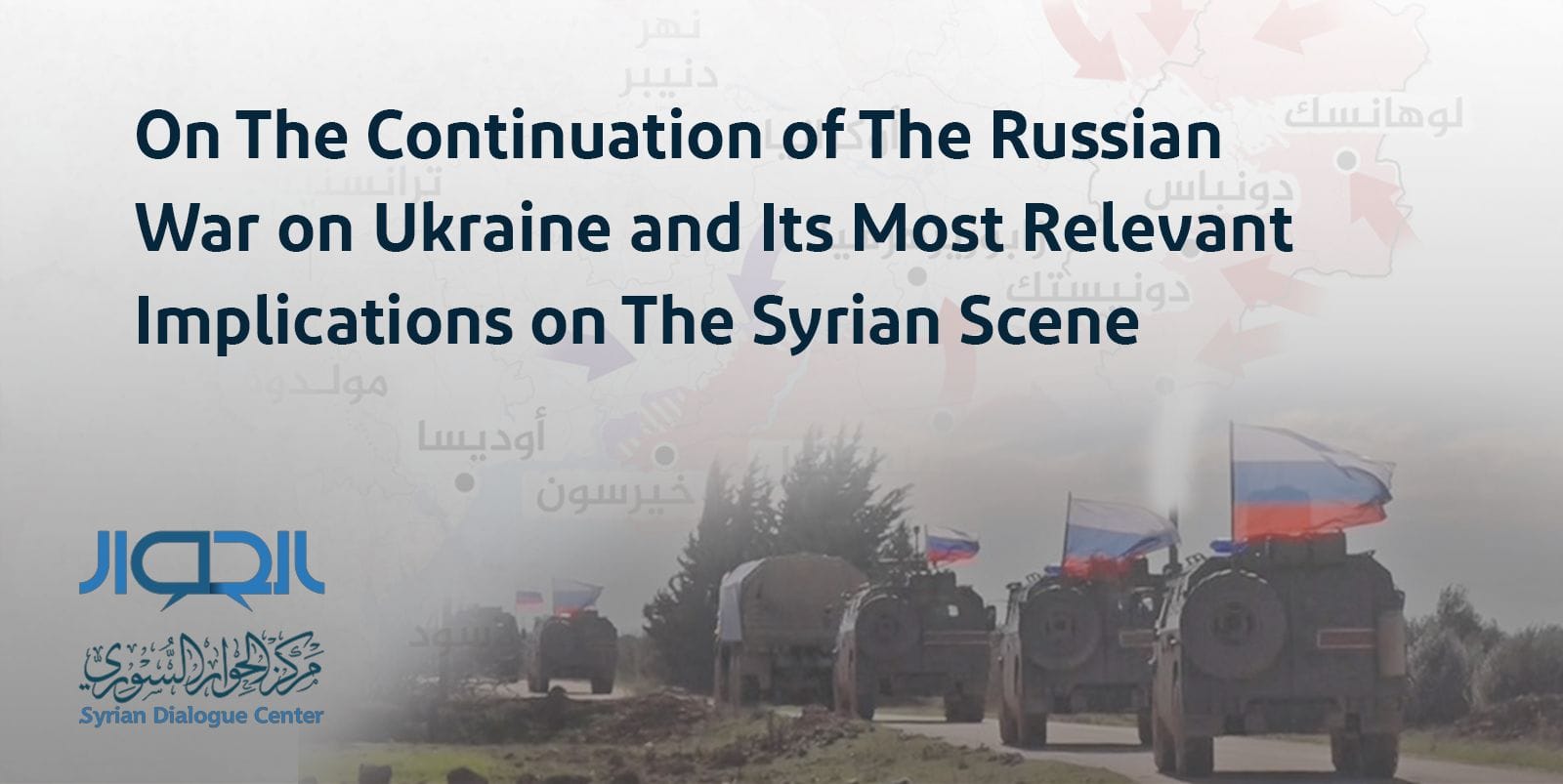
On The Continuation of The Russian War on Ukraine and Its Most Relevant Implications on The Syrian Scene
Introduction:
The Russian war in Ukraine has entered its fourth month, the negotiations between the two sides have halted, and chances to secure a decisive military victory for either side are diminishing, especially after the shrinking of combat fronts and being almost exclusively in east Ukraine since Nisan/April with the war entering its second month.
This situation in Ukraine naturally carries with it continued tensions between Russia, and the United States and its European allies, as well as a remaining opportunity for relative changes in the balance established in the Syrian scene; that is given that Russia being distracted by its war on Ukraine represents a chance for other actors in the Syrian issue to achieve some militaristic or political breakthroughs, without causing a complete explosion of the current situation.
This brief analysis aims to predict the possible implications of the continuation of the war in Ukraine on the Syrian issue, through drawing a brief image of the development on the field with regards to the war in Ukraine and its economic and political repercussions on both the global and regional level, as well as the changes to the balance Russia had with regional powers that are powerful and effective in the Syrian issue, like “Israel” and Iran, leading to predicting the possible implications of the war in Ukraine on the Syrian scene.
Firstly: The Russian war in Ukraine in its 4th month: Losing the attack momentum and limited Russian gains
The Russian forces have begun retreating from the surroundings of the Ukrainian capital Kiev and the region of central Ukraine towards the east of the country, and even though the kremlin has announced that the goal of the “special military operation” that Russia launched in Ukraine was indeed to control the east of Ukraine, these statements seem to have the intention of covering up the critical failure the Russian forces met when trying to take over the capital. Here Ukraine achieved a victory by securing its existence; nevertheless, this was not enough to stop the war. On the other hand, Russia achieved a strategic gain by connecting the overland route between the Crimean Peninsula it occupied in 2014, and the separatists in the Donbass region.
In general, the continuation of the war is an indicator of the poor performance of Russian intelligence and military contrary to expectations; perhaps that is due to two factors, the first being the fierce resistance the Ukrainian troops have shown that was successful of course due to securing massive militaristic and financial support from the United States and her allies, and the second being several strategic and logistical mistakes made by the Russians that were based on miscalculated expectations and predictions. In addition to low morale among the Russian troops and little motivation to fight, as well as relying on lower grade troops and fresh recruits. In conclusion this forced Russia to suffer great losses and change its plans and ambitions in Ukraine.
Conclusion:
The Russian war in Ukraine is entering its 4th month with militaristic stagnation on the ground and political disruptions on the negotiations table, which means a continuation of anxiety and struggle between Russia on one side and the United States on the other, a matter that keeps the world watching anxiously trying to know what the repercussions of this war will be.
It also seems that maintaining the status quo is the option all actors in the Syrian issue have preferred since the beginning of the war, however that does not mean that the situation will indeed remain as it was with the war entering its 4th month. The possibility of Russia focusing more on Ukraine and it experiencing even more militaristic and economic exhaustion can be a chance for change in regions of control in Syria, as could be the case for Turkey for example. There is also room for the Iranian militias to make a move to fill the power vacuum if it is left.
On the other hand, to the Syrian revolutionary and opposition forces, this situation presents a chance to reaffirm the factors of stability in the Syrian north west, as well as developing its institutional and governing mechanisms benefiting from less Russian attention and Turkish motivation to expand. If the Moscow agreement between Russia and Turkey were to fail, indeed these regions were under a very real threat of returning to military operations and the policy of occupation and displacement that Assad’s regime follows aided by the Russian air force, however the chances of the agreement’s continuation seem to increase greatly. Meaning that the -as previously mentioned- revolutionary and opposition forces have a very good chance to file their ranks properly and stabilise the regions they control.
To read the complete paper (Arabic)
مؤسسة بحثية سورية تسعى إلى الإسهام في بناء الرؤى والمعارف بما يساعد السوريين على إنضاج حلول عملية لمواجهة التحديات الوطنية المشتركة وتحقيق التنمية المستدامة





